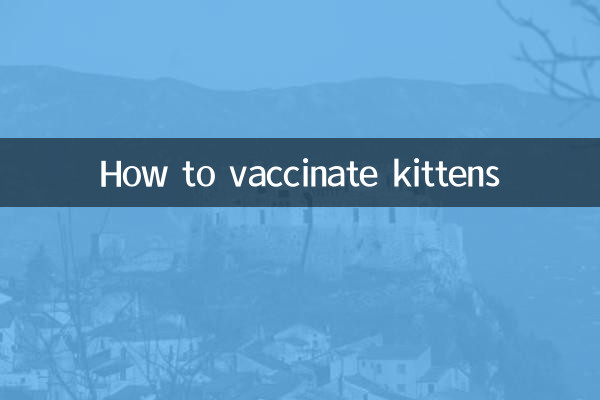How to vaccinate kittens
Cat owners know that vaccinating kittens is an important step in ensuring their health. Recently, hot topics about pet vaccinations have continued to rage on social media and pet forums, and many novice cat owners have questions about how to properly vaccinate their kittens. This article will introduce in detail the kitten vaccination process, precautions and frequently asked questions to help you scientifically care for your pet.
1. Kitten vaccination schedule

Kittens’ vaccinations need to be carried out according to a scientific schedule. The following are common vaccine types and vaccination schedules:
| Vaccine type | First vaccination time | Booster time | function |
|---|---|---|---|
| cat triple vaccine | 8-9 weeks old | 12 weeks old, 16 weeks old | Prevent feline distemper, feline nasal congestion, and feline calicivirus |
| rabies vaccine | 12 weeks old | once a year | Prevent rabies |
| leukemia vaccine | 9-10 weeks old | Strengthen after 3-4 weeks | Preventing Feline Leukemia |
2. Preparation before vaccination
1.health check: Before vaccination, it is necessary to ensure that the kitten is in good health and has no symptoms such as fever and diarrhea.
2.deworming: It is recommended to complete internal and external deworming 1 week before vaccination to avoid parasites affecting the vaccine effect.
3.environmental adaptation: Let kittens adapt to the cat bag or flight box in advance to reduce stress when going out.
3. Precautions after vaccination
1.Observe reaction: After vaccination, you need to stay in the hospital for observation for 30 minutes to confirm that there is no acute allergic reaction.
2.home care: Avoid bathing and strenuous exercise within 24 hours, and provide a quiet rest environment.
3.Diet management: Maintain a normal diet and supplement with appropriate nutritional cream to enhance immunity.
4. Frequently Asked Questions
| question | Answer |
|---|---|
| Can the vaccine be given in advance? | Not recommended, maternal antibodies will interfere with vaccine effectiveness |
| What should I do if I miss the vaccination time? | Revaccinate as soon as possible, and the vaccination plan needs to be re-evaluated |
| Will the vaccine have any side effects? | A few cats may develop low-grade fever and loss of appetite, which usually heal on their own within 1-2 days. |
5. Extension of recent hot topics
1.Vaccine safety controversy: A well-known pet blogger shared a vaccine allergy case and triggered a discussion. Experts recommended choosing a regular pet hospital for vaccination.
2.New vaccine development trends: A scientific research institution announced the successful development of a feline infectious peritonitis vaccine, which is expected to be launched within 2 years.
3.Home vaccination service: Pet hospitals in many places have launched door-to-door vaccination services, with prices 30-50% higher than those in hospitals.
Summary: Scientific vaccination is the first line of defense to protect kittens’ health. It is recommended that cat owners follow veterinarian guidance, complete the vaccination program on time, and pay attention to the latest vaccine-related information. remember"Prevention is better than cure"principles to let your pet grow up healthily.

check the details

check the details